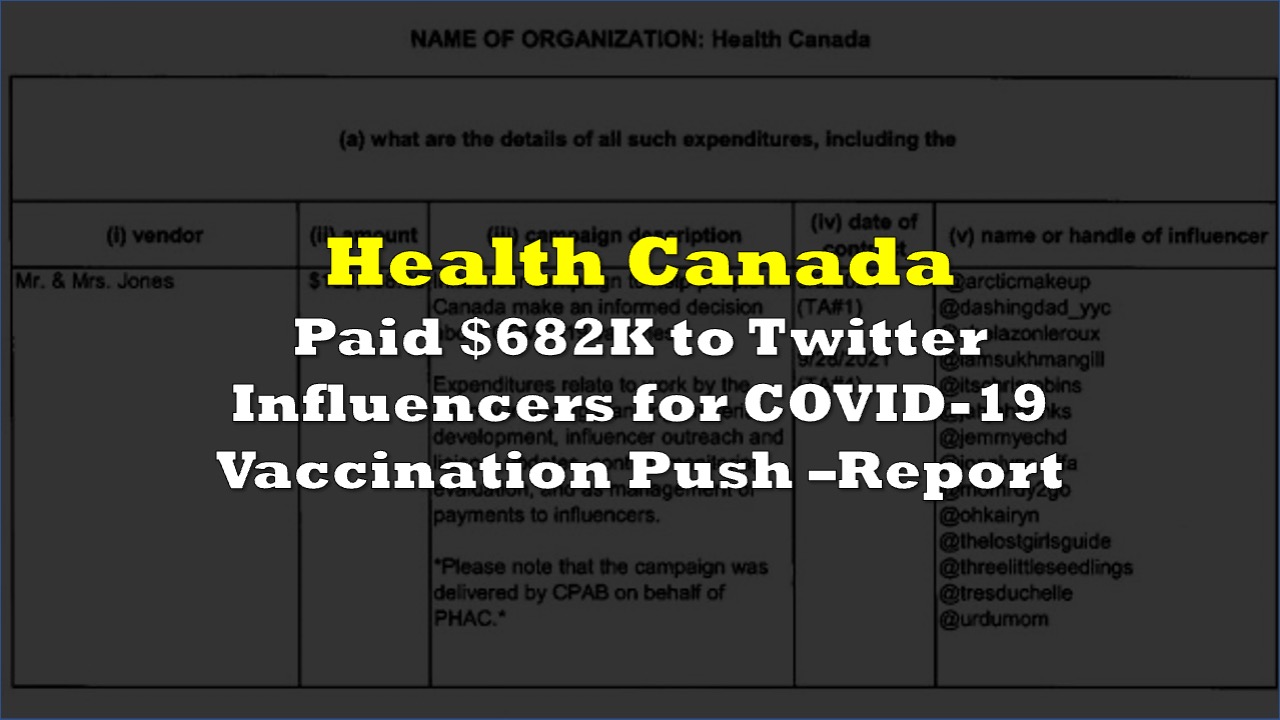Government
Health Canada Paid $682K to Twitter Influencers for COVID-19 Vaccination Push –Report
In a bid to encourage Canadians to embrace Covid-19 vaccination and support Liberal policies, the Trudeau government has reportedly paid
The post Health…

In a bid to encourage Canadians to embrace Covid-19 vaccination and support Liberal policies, the Trudeau government has reportedly paid influencers on Twitter, the platform now known as X, in 2021.
Blacklock’s Report found that Health Canada disbursed $682,000 to 14 influencers to “help people in Canada make informed decisions about COVID-19 vaccines,” the expenses encompass various aspects, including planning, material development, influencer outreach, updates, content monitoring, evaluation, and payment management to influencers.
The news subscription outlet said that the influencers “are not required to reveal they are government-paid influencers because that, of course, would be very embarrassing,” but it’s unclear where this quote comes from.
Most of the 14 influencers are no longer active on X. As of this writing, two have commented on their involvement in the campaign. Chelazon Leroux confirmed that she was paid by Health Canada but it was to talk about her Covid experience and why she chose to get the vaccine, “not to force anyone else.”
Kai Potts, who has since made her account private, said that she “wasn’t ‘quietly’ paid to promote the vaccine,” adding that she was “in fact, quite loud (and required by law) to include #sponsored and #ad.”
In March 2022, CTV revealed that the Trudeau government had utilized social media influencers across federal departments, spending over $600,000 at that time to promote vaccination and other government initiatives. That report acknowledged this strategy as a relatively new approach deployed by administrations globally, emphasizing Canada’s adoption of influencer outreach as a communication tool.
“Seeking out influencers—social media users often with large followings who often use their platforms to make money by promoting products or events—to amplify government messages is a relatively new strategy being deployed by administrations across the world, and Canada is no exception,” they wrote.
A way to fight misinformation
Earlier this week, CTV also reported that Alberta Health Services (AHS) is “considering hiring social media influencers to help with its advertising,” particularly to raise awareness about “how to treat their child at home rather than the emergency room, fitness, quitting smoking and lung cancer screening, as well as Health Link 811.”
AHS initially posted that it was looking for influencers on the influencer platform Embold, but later deleted the post, saying it was posted “erroneously” and was “premature.” But Dr. Shazma Mithani, an emergency physician at Royal Alexandra and Stollery Children’s Hospitals in Edmonton, told CTV that AHS should do it.
“Every avenue available to try to get health information that’s credible out to people needs to be used,” she said.
“Since the pandemic, we’ve seen such a massive rise in misinformation in the world of media and social media. And so, it’s so important to now, in particular, have people who have appropriate training and credentials to be out there to try to cut through that noise of misinformation.”
Information for this story was found via Blacklock’s Report, CTV, and the sources and companies mentioned. The author has no securities or affiliations related to the organizations discussed. Not a recommendation to buy or sell. Always do additional research and consult a professional before purchasing a security. The author holds no licenses.
The post Health Canada Paid $682K to Twitter Influencers for COVID-19 Vaccination Push –Report appeared first on the deep dive.

Here Are the Champions! Our Top Performing Stories in 2023
It has been quite a year – not just for the psychedelic industry, but also for humanity as a whole. Volatile might not be the most elegant word for it,…
AI can already diagnose depression better than a doctor and tell you which treatment is best
Artificial intelligence (AI) shows great promise in revolutionizing the diagnosis and treatment of depression, offering more accurate diagnoses and predicting…
Scientists use organoid model to identify potential new pancreatic cancer treatment
A drug screening system that models cancers using lab-grown tissues called organoids has helped uncover a promising target for future pancreatic cancer…














